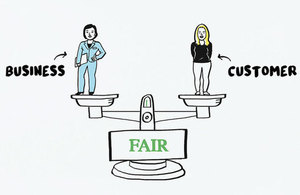Over half of businesses don’t know unfair contract rules well
Consumers and businesses are both at risk of losing out as new research reveals many firms do not know the law on terms and conditions well.

Unfair contract terms illustration
The Competition and Markets Authority (CMA) has today published research amongst UK businesses which reveals that 54% of those surveyed don’t fully understand the rules on unfair terms, which directly impacts how they treat their customers.
Research for the CMA also revealed that some businesses think a signed contract is final, not realising that they can’t enforce a term against a consumer if it’s unfair. Others may copy terms from larger businesses or competitors, assuming incorrectly that these will be automatically fair and legally binding.
In response the CMA has today launched a new campaign, consisting of simple videos and guides, to inform businesses about what makes a term ‘unfair’ and help them understand how to treat their consumers fairly.
Unfair terms are those that give businesses an unfair advantage over consumers, often by reducing their rights or ability to complain if things go wrong. For example, they can include:
- keeping all of a customer’s deposit if they cancel, regardless of the amount the business is actually losing as a result
- using excessively long notice periods that end up tying customers into a contract for longer than they want
- excluding the business’ liability for things that are its fault (ie delays, or faulty goods or services)
The research showed that less than half (45%) of those surveyed claimed to know the rules on unfair terms well, whereas 36% owned up to not having a strong grasp, and 18% admitted they had never heard of them.
It also found that 67% of UK businesses sell to consumers, with most of these using some form of terms and conditions. The rules on using unfair terms are set down in the Consumer Rights Act (CRA) 2015. However, only 15% said they were familiar with the Act when asked.
Paul Latham, Director of Communications at the CMA, said:
Consumers have a right to be treated fairly – and businesses need to know that they can’t rely on their terms and conditions if they’re not fair.
We know that the majority of businesses want to do the right thing by their customers, but it’s worrying that many businesses are not familiar with the law.
That’s why we have launched this campaign to help businesses protect themselves against breaking the law, and against using contracts that they can’t enforce.
Leon Livermore, Chartered Trading Standards Institute Chief Executive, said:
Consumers often have little choice but to accept terms and conditions, so it’s vital to know that they’re getting a fair deal.
The CMA’s guides are a way of helping businesses understand their obligations but trading standards services are also on hand to advise or take enforcement action against those who do not comply.
Mike Cherry, Federation of Small Businesses (FSB) National Chairman, said:
Clear guidance is important, in what is a complicated area of law. Businesses want to treat consumers fairly and they need the right information. It’s good to see the CMA taking this positive step to help firms comply when setting out contract terms.
To assist consumers and businesses, the CMA has today launched a series of guides on how businesses can check their own terms for ‘fairness’. These include:
- animated videos on common areas where terms can be unfair
- simple at-a-glance guides
- an online quiz for businesses to check how much they know about the law
These short guides complement the more detailed guidance on unfair terms that the CMA produced in 2015. The guides show how fair terms can help save time, avoid disputes with customers and enhance a business’ reputation whilst still protecting them if things go wrong.
Consumers who encounter a problem with a business can get advice from the Citizen’s Advice consumer service.
Notes for editors
- The CMA is the UK’s primary competition and consumer authority. It is an independent non-ministerial government department with responsibility for carrying out investigations into mergers, markets and the regulated industries and enforcing competition and consumer law. For CMA updates, follow us on Twitter @CMAgovuk, Flickr and LinkedIn.
- The Consumer Rights Act 2015, in force from 1 October 2015, aims to protect consumers against unfair contract terms and notices. It applies to wording that lays down the rights and responsibilities of consumers and businesses when entering into agreements with each other. It also applies to consumer notices (often used, for instance, in shops and car parks as well as online).
- The CMA, Trading Standards Services and other relevant bodies have powers to pursue legal action to stop businesses using terms and notices that are unfair. If necessary, this will be achieved by seeking a court order.
- Consumers can get advice from the Citizens Advice consumer service on 03454 040506 or 03454 040505 for Welsh language speakers.
- Media enquiries should be directed to Simon Belgard (simon.belgard@cma.gsi.gov.uk, 020 3738 6472).